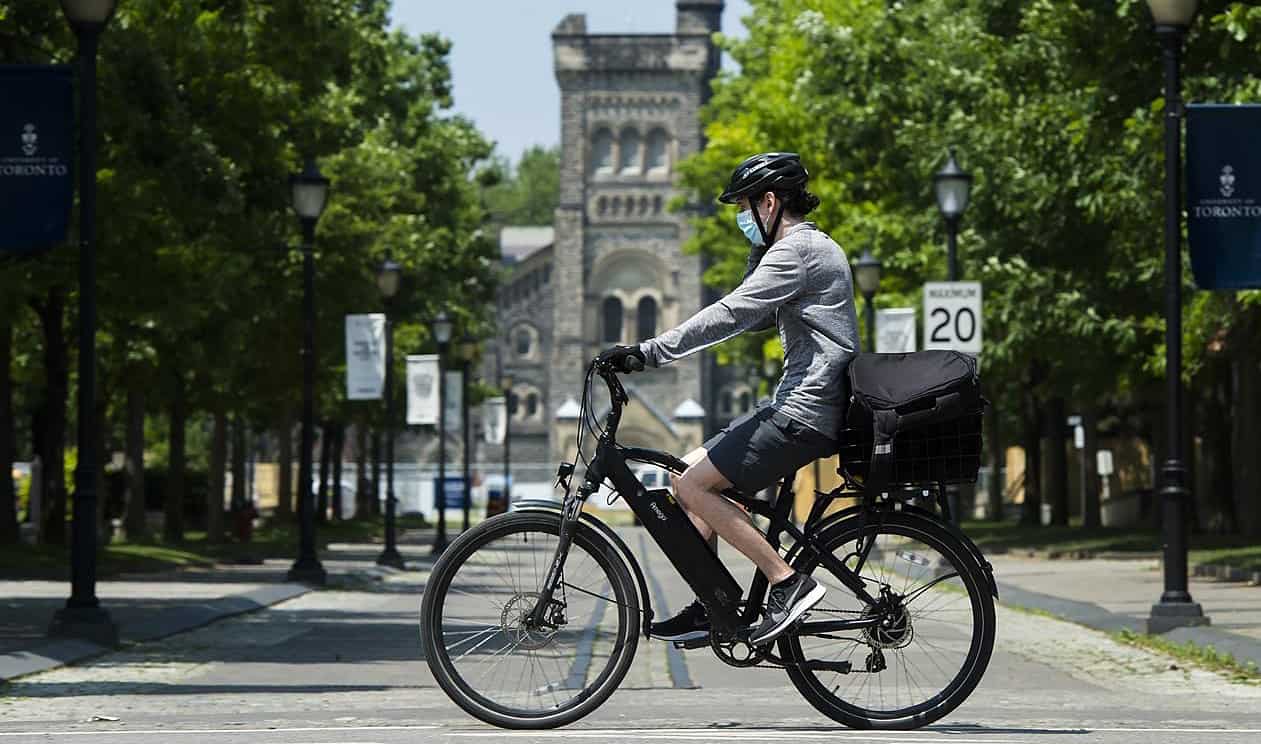Ontario universities set to ‘unenroll’ unvaccinated students from campus
Published October 23, 2021 at 1:09 pm

Several universities in Ontario are moving to bar unvaccinated students from campus as their mandatory vaccination policies take full effect.
The schools say the vast majority of their students have now provided proof of COVID−19 vaccination, but the few that have not will in most cases no longer be able to access university buildings or attend on−campus classes and activities.
At the University of Waterloo – where about 95 per cent of students have had a COVID−19 shot – a spokesman said those who aren’t fully immunized cannot take in−person classes and in many cases won’t be able to continue their education at the school.
“Those students can consider continuing to pursue their education by selecting from among the online courses that are scheduled, perhaps as a part−time student,” said Chris Wilson−Smith. “(They can consider) taking relevant courses at another university on a letter of permission, or delaying their learning at Waterloo indefinitely.”
McMaster University in Hamilton, where 96 per cent of students taking in−person classes have submitted proof of vaccination, said unvaccinated students without valid exemptions will be unenrolled from winter courses as there’s an expectation they’ll need to attend campus at some point next semester.
For the fall term, the school said those who didn’t provide proof of vaccination by an Oct. 17 deadline will likely be able to complete their courses remotely.
“However, they are not allowed to come to campus for any activities,” said spokesman Wade Hemsworth.
At York University in north Toronto, the few students who have not declared their vaccine status risked “de−enrolment” from in−person classes, according to information posted on the school website.
“As of Tuesday, October 19, 2021, university community members who have not provided proof of vaccination or received an exemption are not permitted to attend campus,” said Yanni Dagonas, noting that 97 per cent of almost 32,000 students are fully vaccinated.
At many schools, students have been required to upload proof of vaccination to online university portals. Their vaccine information is then linked to their student cards, which are used to enter many university buildings.
Universities aren’t having staff stop students on campus to demand proof of vaccination, but are directly contacting those who have yet to declare their vaccine status to discuss their options.
The University of Ottawa said only two per cent of its nearly 42,500 students are unvaccinated or haven’t declared their vaccination status. The school is now in discussions with those students – who aren’t permitted on campus – to provide them with online alternatives.
At the University of Toronto, 96 per cent of nearly 86,500 students and employees have submitted proof of full vaccination, and another 3 per cent have their first shot. Students have to be fully vaccinated by Oct. 29 to maintain access to campus.
Dr. Salvatore Spadafora, the special advisor to the university’s president and provost on COVID−19, said the vaccine mandate is an important part of the school’s goal of having in−person learning resume widely as quickly as possible.
“In−person is critical to effective learning, and for students’ mental health and well−being,” he said.
For a few students, the enforcement of the vaccine mandates mean their education plans may have to change.
Taydon Sinopoli, a third−year environmental engineering student at the University of Waterloo, said he has chosen to not get vaccinated for religious reasons and has submitted a request for an exemption to the vaccine mandate.
He said the exemption application required, among other things, a letter from a religious leader explaining why his beliefs prohibit him from getting the vaccine. Sinopoli, who identifies himself as “non−denominational Christian,” said he couldn’t find a Canadian church or a priest to write a letter for him, so he had to seek one from an American church.
“The reason why I’m choosing not to vaccinate is because I believe that when Jesus died on the cross, he not only died for our sins, but he also died for salvation and that we have the ability to live free from sickness and disease,” he said. “Getting the vaccine would basically diminish my faith and trust in God.”
Sarah Gingerich is also opposed to post−secondary vaccine mandates and has decided to take a year off from pursuing her education at the Canadian College of Naturopathic Medicine in Toronto.
She said getting vaccinated is a personal choice and argued it shouldn’t be a condition students have to meet to get the education they want.
“I chose not to go to school this year because I didn’t believe in subjecting myself to unjust mandates,” she said.
Many post−secondary institutions brought in mandatory vaccine policies this summer after the Council of Ontario Medical Officers of Health recommended that they do so.
Maan Alhmidi, The Canadian Press
INsauga's Editorial Standards and Policies


